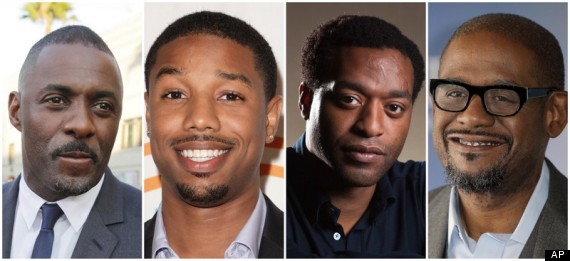
Idris Elba, Michael B. Jordan, Chiwetel Ejiofor and Forest Whitaker.
In bleak situations, incremental improvements can be mistaken for big time progress. So it goes with Hollywood's consistent inability to include actors of color.
Popular critical consensus suggests that we may have as many as four black Best Actor nominees: Chiwetel Ejiofor ("12 Years a Slave"), Idris Elba ("Mandela: Long Walk to Freedom"), Forest Whitaker ("Lee Daniels' The Butler") and Michael B. Jordan ("Fruitvale Station"). Ejiofor is currently favored to win the category, where he'll probably be joined by the likes of Tom Hanks ("Captain Phillips"), Robert Redford ("All Is Lost") and Bruce Dern ("Nebraska").
That these men of color are even being discussed in awards blogger circles is certainly cause for celebration, because each of their films presents a perspective that doesn't get much play in Hollywood. But insofar as these four movies are important, they are also limited by their veracity. They're all based on true stories: "12 Years" tells the tale of Solomon Northup, a free black man who was captured and enslaved and wrote an autobiography by the same name; "Mandela" is self-explanatory; "Fruitvale Station" centers on the 2009 shooting death of Oscar Grant III, a black man shot dead by a police officer in Oakland; "The Butler" draws its meat from the life of Eugene Allen, a black butler who worked for the White House for over three decades.
Put another way, these roles have to be played by black actors. Each of these men has more than earned the nominations they're expected to receive (now's a good time to pinch in some salt: awards bloggers love to shower performances with praise, but nominations are certainly not guaranteed), but the fact that they're generally only rewarded for roles that literally could not have been given to white actors is cause for concern.
"Generally only rewarded for roles that literally could not have been given to white actors" is not casual phrasing. A study of the roles that have earned black men Best Actor nominations reveals that this is a historical problem. Sidney Poitier won in 1963 for playing a black itinerant worker in "Lilies of the Field," a movie based on a novel by the same name. Jamie Foxx won in 2004 for playing Ray Charles in "Ray," and Forest Whitaker won in 2006 for playing Idi Amin in "The Last King of Scotland." The only black man to win Best Actor for a role that could have been played by a white actor is Denzel Washington, who won in 2001 for his turn as a LAPD detective in "Training Day."
That's one man over 85 years of Academy Awards. The situation isn't much better at the Golden Globes, where Morgan Freeman's performance as a chauffeur who triumphs over racism in "Driving Miss Daisy" joins the otherwise identical list of Best Actor winners. (Nor, it's worth noting, does the picture improve when including Best Actor nominees at the Oscars, a class that includes blacks playing "black roles" such as Will Smith in "Ali," Don Cheadle in "Hotel Rwanda," Terrence Howard in "Hustle & Flow," Freeman in "Invictus," Washington in "Malcom X," Laurence Fishburne in "What's Love Got to Do With It," etc.)
Jordan has discussed enjoying filming "Chronicle," which he describes as a win because the character was originally supposed to be a white Jewish man. "[With] the lack thereof of quality roles for African-American actors, I look for stuff like that," he said in an interview with HuffPost Entertainment. "I want the script that Ben Affleck or Leonardo DiCaprio couldn't do because of scheduling. I want that one. I want those types of roles."
Hollywood is even worse at including women of color in award-winning performances, (Halle Berry is the only black woman to ever win the Oscar for Best Actress, in a "Monster's Ball" role with a complex and controversial relationship with race), and this year's Emmys were a shockingly white-male affair. "12 Years," "The Butler," "Fruitvale" and "Mandela" all cleared an extra hurdle: they are are all independently financed films that were created without the interest or fiscal support of the major movie studios.
True equality in the Best Actor race doesn't mean only rewarding black men in roles white men could never play. Instead, we'll know when Hollywood casting directors and the Academy of Motion Picture Arts and Sciences view people of color as deserving of equal opportunities to shine when a black man in the role of a fictional caring father, son, teacher, student, doctor, author or otherwise non-racially coded character is nominated for and wins Best Actor.
Until then, however, let's raise a glass to this year's class of outstanding performers, because maybe, just maybe their success in this year's awards rat race will jostle the shamefully whitewashed powers that be within the industry. Forgive me for not getting my hopes up.
This story appears in Issue 72 of our weekly iPad magazine, Huffington, available Friday, Oct. 25 in the iTunes App store.
